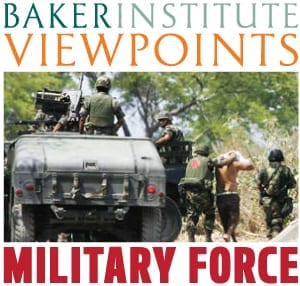 While on the campaign trail, Enrique Peña Nieto — now Mexico’s president — sought to de-emphasize the military’s role in the drug war by supporting the creation of a national gendarme and the widespread expansion of the Todos Somos Juarez, a civil society development plan. Yet the proliferation of vigilantes taking up arms to defend their villages against drug-related violence recently forced the federal government to send soldiers to Michoacán. Like his predecessor, Felipe Calderón, Peña Nieto seems poised to again put his country’s military front and center in the fight against cartels. In this five-part Baker Institute Viewpoints series, we evaluate a fundamental question for all democratic societies facing organized crime threats: Is the deployment of troops in a domestic conflict with organized crime an appropriate use of combat forces?
While on the campaign trail, Enrique Peña Nieto — now Mexico’s president — sought to de-emphasize the military’s role in the drug war by supporting the creation of a national gendarme and the widespread expansion of the Todos Somos Juarez, a civil society development plan. Yet the proliferation of vigilantes taking up arms to defend their villages against drug-related violence recently forced the federal government to send soldiers to Michoacán. Like his predecessor, Felipe Calderón, Peña Nieto seems poised to again put his country’s military front and center in the fight against cartels. In this five-part Baker Institute Viewpoints series, we evaluate a fundamental question for all democratic societies facing organized crime threats: Is the deployment of troops in a domestic conflict with organized crime an appropriate use of combat forces?
In mid-May, the residents of La Ruana and other towns in Mexico’s western state of Michoacán lined roadsides to cheer the arrival of thousands of soldiers to their territory. “After three months of fighting, we can sleep peacefully in our homes,” enthused the leader of a group of townspeople who had formed a self-defense militia to defend against the violent drug-trafficking organizations blatantly controlling the area.
Normally, the declaration of virtual martial law would be nothing to celebrate. But in Michoacán’s Tierra Caliente region, residents see no other option. The Mexican Army’s arrival was the first sign in years that the government was doing something to protect them.
Six years ago, after the December 2006 inauguration of then-President Felipe Calderón, Michoacán saw a similar deployment of troops, the beginning of the Calderón government’s dramatic nationwide expansion of military involvement in public security. The troops helped to take down the Familia Michoacana cartel that then dominated the zone. But then most deployed elsewhere, leaving behind corrupt, poorly trained police and an underfunded, ineffective justice system. A new cartel quickly filled the vacuum. Abandoned by a state thoroughly penetrated by organized crime, entire communities were subject to extortion and daily acts of violence.
So once again, Mexico’s Army is serving as a de facto police force in Michoacán, patrolling neighborhoods, manning roadblocks, detaining and interrogating suspects, and hunting down organized crime leaders considered “high value targets.” There appear to be no other good options today in Michoacán, several other Mexican states, and much of Central America, the Caribbean, and the Andes where violent crime rates have been spiraling upward since the 1990s.
But sending in the troops to do police work or enforce drug laws, though, is a poor choice. It is a last resort, an admission that all other government institutions have failed.
Certainly, armies have some advantages over civilian police. Unlike overstretched police, they can “surge” into violence-torn neighborhoods, dissuading criminals through their sheer physical presence on patrols and roadblocks. Soldiers normally have better discipline, intelligence, and firepower.
But the military also brings some crippling disadvantages to the anti-crime fight. Soldiers’ presence may scare off criminals in one area, but that usually just displaces the problem somewhere else. Combat soldiers lack the capacity to investigate and solve crimes that they did not witness themselves. Based in barracks and rotating frequently in and out, they have no knowledge of the communities they are assigned to protect. They tend to lack police forces’ ability to respond quickly to emergency calls. They lack training in the rules of evidence and working with the justice system, rendering them useless for the difficult task of unraveling complex organized crime networks.
In particular, sending combat-trained soldiers to operate alongside the civilian population carries a huge risk of human rights abuse. While police are trained to protect and serve populations using minimal violence, soldiers are trained to defeat an enemy with overwhelming force. With this training, having troops patrol neighborhoods, search and seize property, capture and interrogate suspects, and man roadblocks is to invite a sharp increase in human rights violations like homicide, torture, assault, rape, and property theft. That is what Mexico has experienced since the Calderón government first launched its anti-crime offensive: the national human rights ombudsman’s office a more than fivefold increase in complaints of abuse at the hands of the armed forces between 2007 and 2011.
Sending the military to do police work also challenges fragile civil-military relations. With civilians relying on the military even for protection from their fellow citizens, the armed forces have far greater bargaining power. It becomes much harder to say “no” to the officer corps on issues like budgets, punishing abuses or corruption, or stopping them from assuming still other civilian roles. The civil-military balance is a key reason why U.S. law strictly prohibits the military’s use in police duties, except under very rare, very temporary emergency circumstances (the 1992 L.A. riots, the 2005 Hurricane Katrina aftermath).
If the police have failed, though, and the military is the only tool, what can Mexico do? Mexico must protect its citizens first, so deploying the armed forces in the very short term is better than doing nothing. But the military alone will not solve Mexico’s security problems — and may make things worse in the medium to long term — if Mexico isn’t at the same time implementing, and funding, a credible plan to replace them. This plan would need to include a thorough overhaul of policing, deep reforms to the justice system, and taxes on the wealthiest citizens to pay the increased cost, so that when the armed forces pull back, they leave something else — something civilian — behind.
Does the government of President Enrique Peña Nieto, who took office in December 2012, have such a plan in place? Unfortunately, it does not. After six months in office and almost a year after Peña Nieto’s election, the new government has presented only the broad outlines of a plan.
One challenge is Mexico’s division of police responsibilities across the federal, state, and municipal level: there is only so much civilian policing that the central government can control. At the federal level, Peña Nieto has announced intentions to continue building up the 35,000-person Federal Police force (currently smaller than the New York Police Department), and to create a new, 50,000-person “Gendarmería” or mobile constabulary. This new force, though, will be made up of personnel who have left the Army and Navy, and there is no clarity yet about how they will work or how their training will differ. Meanwhile, judicial reform — mainly a state-by-state transition from a written to oral trial systems — is moving with great slowness, remains under resourced, and in many states is hobbled by corruption.
A plan to replace Mexico’s armed forces with civilians is not yet truly in place. Nor is it clear that it is getting the resources or political backing it needs. Without a credible, well-funded plan, though, Mexico will be condemned to repeat the Michoacán scenario for a long time to come. As repeated deployments of the military into the public security sphere continue, the resulting damage to human rights and democratic civil-military relations will be ever more severe.
Read other posts in this series:
- Mexico’s use of the military in the drug war: Why no alternative?
- Why Mexico’s military is fighting the country’s drug war
- Mexico’s military plays a necessary role in internal security
- Can Mexico be in an ‘armed conflict’ with criminal gangs?
 Guest author Adam Isacson is the senior associate for regional security police for the Washington Office on Latin America, a nongovernmental organization that promotes human rights, democracy and social and economic justice in Latin America and the Caribbean.
Guest author Adam Isacson is the senior associate for regional security police for the Washington Office on Latin America, a nongovernmental organization that promotes human rights, democracy and social and economic justice in Latin America and the Caribbean.